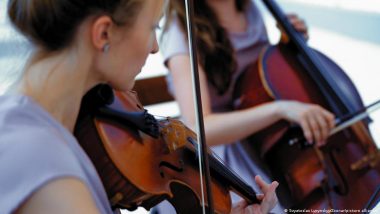In this episode of DW Festival Concert, we listen to Finnish conductor Klaus Mäkelä directing Mahler's "tragic" symphony and music by his compatriot Kaija Saariaho."Well, conducting for me is an exchange of ideas, and it's a creative dialogue. And a conductor has to lead, but a conductor also has to listen and to make people listen," says Klaus Mäkelä, one of the most celebrated young conductors in the world.
Also Read | Nita Ambani Dances to ‘Raghupati Raghava Raja Ram’ at NMACC Opening Event (Watch Video).
Born in 1996 in Helsinki, Finland, he's already led major ensembles in Norway and France. In 2027 he's slated to become chief conductor of the renowned Concertgebouw Orchestra in the Netherlands.
Also Read | India News | TSPSC Official Appears Before SIT in Paper Leak Case.
Mäkelä is already working intensely with the Dutch ensemble to present impressive performances, including the one we'll hear today, which features Mahler's colossal Symphony No. 6 and "Orion" by Kaija Saariaho.
Kaija Saariaho is considered one of the most important contemporary living composers. Conductor Klaus Mäkelä is a real advocate of her music. "She's able to create this soundscape — it's almost like looking at the great landscape. And slowly you start getting lost in the landscape, which is a very beautiful idea."
Saariaho composed "Orion" in 2002 as a commission for the Cleveland Symphony Orchestra.
Mahler's 'Tragic' Symphony
Austrian composer Gustav Mahler's Symphony No.6 is sometimes called the "Tragic" symphony, and it tells a story of life and death — or rather, a story of life that ends in death.
Yet interestingly, Mahler composed it during a relatively happy period of his life, during the summers of 1903 and 1904 while vacationing with his family in Maiernigg, a lakeside village in southern Austria. Due to his prestigious position as director of the Vienna Court Opera, which he held from 1897 to 1907, Mahler could only really dedicate himself to composition during the summer months.
His summer days revolved around composing in a little hut that was tucked away in the woods. According to his friend and opera colleague Alfred Roller, Mahler would rise at 5:30 a.m., go for a solo swim and then hurriedly make his way to his hut, where breakfast would be waiting for him. He would then proceed to work for seven hours straight.
Omen of death?
Mahler's wife, Alma, described the days as being quiet and full of blissful family time: "Then summer arrived — and with it, life in Maiernigg, which surrounded us with habitude and stillness. Mahler's productive work began. This time, it was sketches for the sixth symphony. He played a lot with the child, who he toted around and took into his arms to sing and dance with. He was so young and lighthearted then."
Despite the happy picture Alma paints, it's rather futile to listen for such lightheartedness in Mahler's sixth symphony. It's a very complex piece, both musically and emotionally.
Some Mahler fans believe the piece's brutal, driving march and the destructive, even apocalyptic-sounding hammer blows of the last movement prophesize the collective disaster that World War I was to unleash just a few years after the work's premiere in 1906.
Mahler's wife, Alma, naturally took a more personal view: She saw it as an omen of death — that of their daughter Maria in 1907.
A wunderkind's story
Mäkelä, who comes from a musical family, is considered a wunderkind among today's top conductors, and his handling of Mahler's monumental sixth symphony shows just how skilled he is. He's also a virtuoso cellist, yet he already knew, even as a seven-year-old, that he wanted to become a conductor.
Mäkelä was influenced in his approach to conducting by his teacher, Jorma Panula, one of the most famous conducting teachers in music history. Panula's illustrious pupils include Esa Pekka Salonen, Jukka-Pekka Saraste, Sakari Oramo and Pietari Inkinen.
Mäkelä started studying privately with Panula at age 12, and the teacher cultivated his talent with all the care of a gardener tending to a special plant. He currently leads both major French and Norwegian orchestras, and in 2027 he'll become chief conductor of the Netherland's Concertgebouw Orchestra.
The concerts that Mäkelä conducts are often packed with young people. In other words, it's not your stereotypical classical music audience. Is this because Mäkelä himself is quite young? He doesn't think so. He believes it's simply due to the unique experience of sharing a live classical music performance.
"Well, I mean, first of all, for me, art is always a matter of taste. And you can't like everything. But, you know, going to a concert is such a cool experience in a way — it's such a collective and an individual, personal experience at the same time. You know, when you're sitting in the audience, you feel you're a part of a collective, but then you also feel that you are there completely alone."
That's all for this episode of DW Festival Concert with Cristina Burack. Thanks to sound engineer Thomas Schmidt and producer Anastassia Boutsko, and thanks to all of you for listening. We love feedback, so write to us at music@dw.com if there's anything you'd like to share.
This article was originally written in German.
(The above story first appeared on LatestLY on Apr 01, 2023 08:10 PM IST. For more news and updates on politics, world, sports, entertainment and lifestyle, log on to our website latestly.com).













 Quickly
Quickly



















